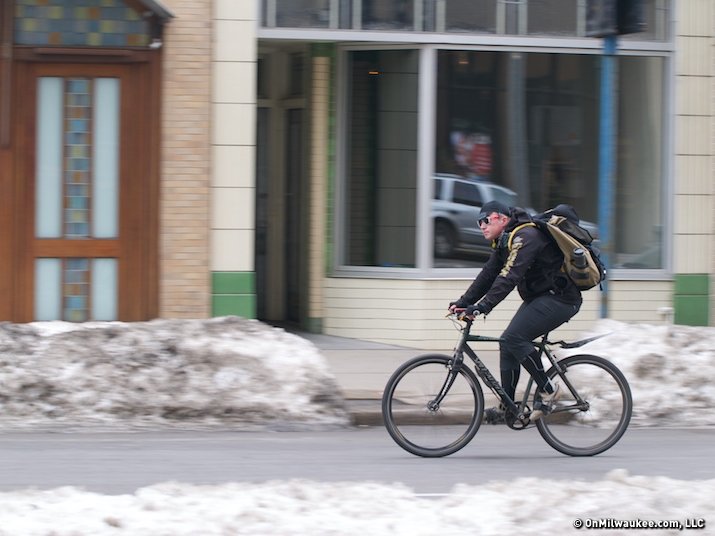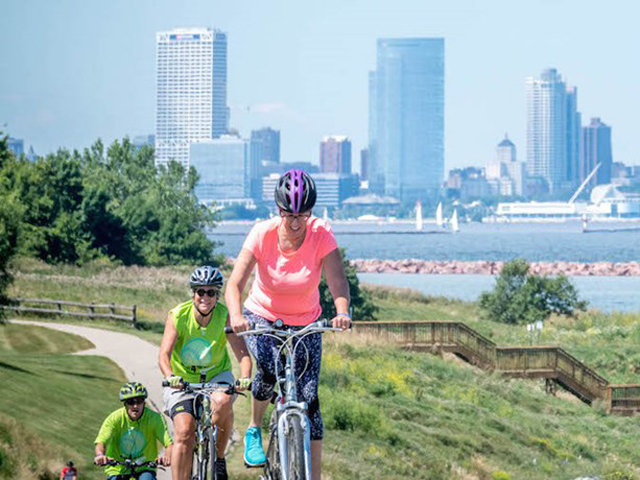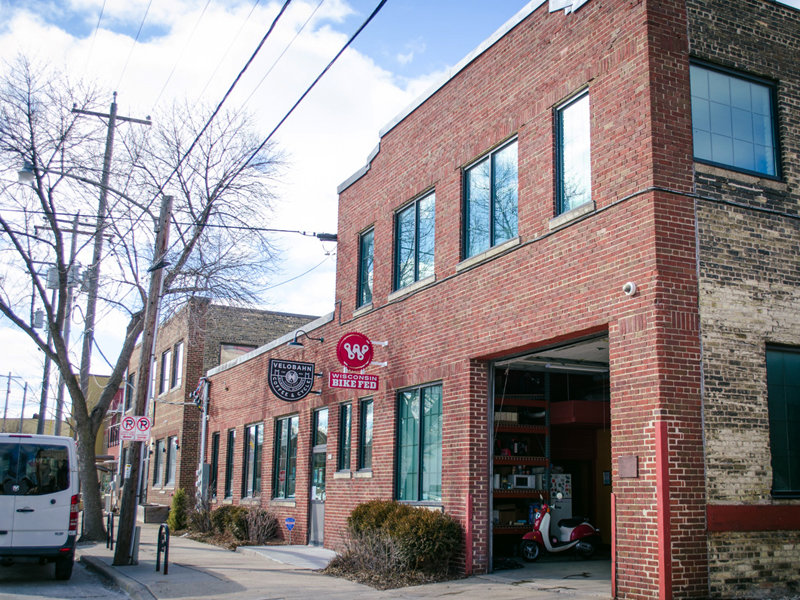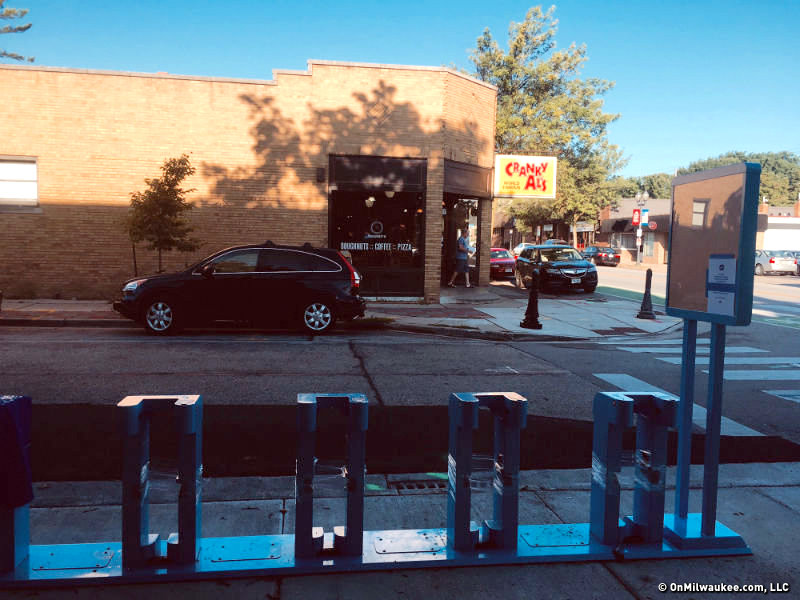Although a few cities claim to be the birth place of bicycle messenger service in the United States – including San Francisco and New York – Milwaukee was certainly one of the industry’s firsts.
In the 1890s, a Western Union Telegraph office opened in the Chamber of Commerce, 225 E. Michigan St. Today, the space houses the Swingin’ Door Exchange where there’s a photo of the messengers, taken in 1894, on the wall, along with a modern picture of local couriers.
In the late 1800s and early 1900s, bicycle messengers transported mail, telegraphs and legal / business records. For a period of time in the mid-1900s, during the rise of the automobile, bicycles and bicycle messengering became somewhat less en vogue.
But that didn’t last long.
Although cars and technology made some communications faster and / or paperless, many businesses and individuals still need to transport hard copies – and transport them near the speed of light.
This is good news for Wayne Wallner, who owns Breakaway Couriers, 224 W. Wells St., and Steven Feih, the owner of Milwaukee Courier Company, 270 E. Highland Ave. These businesses are the only two locally-owned, bonded and insured bicycle courier services in the city.
Wallner started Breakaway in 1998 with three other messengers, John Trusky, John Sharpe and Andy Miller. Today, he owns the company alone.
Feih started his career working for the now-defunct STS Delivery, but decided to start his own business after determining the owner – who had multiple courier services in different cities – did not really understand the messengers’ needs.
"Breakaway got sharp new bags with their logo on them and I realized we didn’t have anything advertising that we were STS. We looked like a bunch of bums wearing bags," says Feih.
So Feih and another employee requested a meeting, but the boss wasn’t available for a month and, when he finally was, they met in an alley between deliveries.
"We asked for jerseys or patches with the company name, told him it would be great for the business, great for branding. He said OK, he would get us polo shirts. Polo shirts? In 90-degree weather? We’re not playing golf here. That was literally the moment I decided I needed to start my own company," says Feih.
Most of the bicycle messenger deliveries – called drops – take place in the Downtown / Third Ward area and are often court house files, blueprints, bank runs, investment firm documents, lunch items and advertising pieces.
"When we’re not on our bike, we’re in an elevator," says Feih. "That bad part is, if you just smoked, you reek and you’re hoping the guy next to you is not the attorney you’re going to pick up from. But usually it is."

Occasionally cyclists will be sent to the suburbs. Both Breakaway and Milwaukee Bicycle Courier have a truck and a driver, but sometimes they are on long drives to neighboring cities and the bicycle messengers need to go the distance.
"We specialize in same-day delivery," says Feih.
Aside from same-day service, there are numerous other advantages to hiring a bicycle courier versus a delivery truck.
"We’re faster. We know the ins and outs at every drop, all of the streets, the timing of the lights, every pothole. We know exactly where we’re going before we walk in the door. And parking isn’t an issue," says Feih. "All of this shaves off seconds, minutes. It adds up."
Breakaway makes between 100 and 150 drops, including lunch deliveries, per day; Milwaukee Courier Company, a newer and smaller company, makes 50-80 daily drops. Deliveries are made between 8 a.m. and 6 p.m. during the week and for a few hours on Saturdays.
"We have constant time restraints. We’re always hustling. The rule is by the end of the day you gotta have an empty bag," says Feih. "By 2 or 3 p.m., you can start to get burned out, but you have to get your second, third, fourth wind. Even if it’s 95 degrees out – endurance is essential."
Less than half of the jobs are placed online, which means Feih – who still rides every day – takes orders in his head while on the road via his Bluetooth.
"Luckily, I have a photographic memory when it comes to a series of numbers. That comes in handy. I can remember phone numbers from when I was a kid, it’s weird," says Feih.
Feih grew up in Brewers Hill with his dad, a painter, and his mom, a waitress, but moved to Cudahy as a teenager after his parents divorced.
"I started riding bikes as a kid and I never stopped," says Feih.
Once in Cudahy, Feih got heavily into BMX riding and received the nickname "Pale Rider" from the other bikers after the 1985 Clint Eastwood film and because of his appearance.
"I’m mostly German and Norwegian. I’m pretty white," he says. "So the name really stuck."
By sophomore year, Feih and his mother were living in motels to escape domestic violence and it became increasingly more difficult for him to focus on school, so he dropped out and started working in factories.
He went on to tend bar at many local establishments, including Trocadero, Pizza Man and Pastiche.
Wallner had some similarities in his childhood and teen years. He grew up in Greenfield and moved to Milwaukee when he was 15 after dropping out of school.
"I was a juvenile delinquent, a runaway. I didn’t have a great family life, so I got out as soon as possible," he says. "I was very good at school, but I couldn’t make the trip to high school after I moved to the East Side. I tried to drive to school with another guy but neither of us had a license and a cop knew it and would pull us over every day and give us a ticket, so I just dropped out."
Today Wallner lives in Riverwest, where he has resided since 1994. Feih lives in Walker’s Point.
"I’m not an elitist and I’m certainly not one to tell people how to think, but I really don’t understand why people don’t live where they work," says Feih. "There is nothing I need that is more than 10 miles away and, if there is – occasionally I might need to make a run to American Science & Surplus – one of my friends will take in their People Mover."
"People Mover" is what Feih calls cars and, no, he does not have one. Wallner does, but he didn’t even have a driver's license until he was 37 and the only reason he got one was because in 2008 he suffered a nearly fatal biking accident and afterward could no longer emotionally handle being the passenger in a vehicle.
Wallner was hit by a truck while attempting to make a delivery in the Third Ward. The accident destroyed a portion of his skull and broke his jaw and neck.
"A truck turned right into me – T-boned me – and I tried to roll into the windshield like you’re supposed to but there were ladders on top of the truck and one was protruding over the windshield and it went 2 1/2 inches into my brain," he says.
With 14 loose chunks of skull and eight bleeding spots on his brain, Wallner wasn’t expected to live through the accident. After numerous, numerous surgeries, Wallner shocked the medical staff and his family by surviving. Doctors told his family that he would never speak again or understand language because of the extensive damage done to his brain.
However, within a month, Wallner recovered to the point that he was back on the job doing desk work and anxious to start bicycling again.
"I had PTSD, but ironically, it didn’t come from riding a bike, but being a passenger in a car," he says. "Before the accident, I didn’t have a car and my girlfriend drove me around, but after the accident I had to get my driver's license and a car because the lack of control was the worst. Biking, however, was completely comforting because I was in control."
Wallner attributes part of his quick recovery to the fact his friend – a former bicycle messenger who became a fire department paramedic – was coincidentally the first person on the scene.
"I don’t remember, but I was talking to him. I was gargling my words and he was trying to keep me talking even though it was complete nonsense. I vaguely remember being comforted knowing he was there," says Wallner.
Aside from the inability to be a passenger in a car, Wallner says the only residual effects from the accident are that music sounds different and he has suffered from occasional "audio hallucinations."
"For about two years after the accident, all music, including my own, sounded horrible. I could hear every individual guitar strum, every note, separately – it was cacophonous," he says.
He also thought he heard pounding on windows even though no one actually was.
"We all know the dangers of this job," says Feih.
Feih has suffered his share of injuries as well, but luckily, never anything life threatening. He also believes he’s more likely to get injured off the job than while on it.
"You lose the focus after work; you still have it, but not like when you’re working. When you’re working there’s zero tolerance for screwing up," he says.
Feih has one simple rule: never alter or stop traffic in any way. He also will not lose his temper while riding.
"I used to flip drivers off, back when I was younger, but that just incites the whole car versus bicycle thing. I finally got smart and traded my middle finger for a thumbs up and it makes all the difference," says Feih.
Wallner admits to his frustrations with car drivers – especially since his accident – who feel they have entitlement over bicyclists because they are behind the wheel, but he agrees that showing anger or disrespect is never the answer.
"Sometimes, people will scream at me to ride on the sidewalk when I’m legally on the street, but I just nod and smile. It’s not worth getting into an altercation with anyone Downtown because chances are we have a professional relationship with that person or someone they know," says Wallner. "To be a bicycle carrier you can’t be a hot head."
For some, injuries and aging shorten a bicycle messenger’s career.
"It’s hard to have a long career lifespan in this business. It wears on you. It’s physically and emotionally tough," says Feih. "But there’s a small pocket of us who are lifers. It’s the Peter Pan lifestyle and I love it. I get to do what not a lot of people can. I get to ride a bike for a living. It’s complete freedom."
Weather contributes to bicycle safety, but neither Wallner nor Feih are fazed by it.
"Weather doesn’t stop people from suing each other," says Feih. "Business keeps going in all weather and so do we ... Old Spice deodorant is the jam."
The weather – and theater of the job – dictate a bicycle messenger’s attire. The fashion is entirely about functionality, comfort and safety.
"The (bicycle courier) style eventually owns you. It’s what you gotta wear every day. I’m always in biking clothing. I’m always that guy in the bright socks and the knickers," says Feih. "Two days out of the month I dress like a normal person and it’s amazing. Clients don’t recognize me."
Wallner says he accepted the "fashion" out of necessity.
"During my first two winters on the job I almost lost my pinkie toe to the cold. I had no idea about Gore-Tex socks, I was using plastic bags," says Wallner. "It took me 13 years to wear goggles because I thought people looked stupid when they wore them, but they’re genius."
Over the years, Feih says Milwaukee has become more progressive when it comes to bicycle friendliness.
"The bike population is growing and the city’s doing a damn fine job," says Feih. "We’re getting bike lane after bike lane."
However, he still has a a couple of pet peeves about Downtown streets.
"The cobblestones on Old World 3rd Street are cute and charming, but they are a beast for everyone and they need to go away," says Feih. "And some of bridge grating is tough. We call them cheese graters because if you fall down, you’re going to put your hands out to stop yourself. If you’re going 20-25 miles an hour, you’re going to tear up your hands or even lose fingers."
Wallner says he used to ride the equivalent of 20-50 miles a day during his workday, but doesn’t ride as much anymore because of increased desk duties.
"I’d like to ride more, especially during the winter. We get to enjoy what little sunshine there is and force ourselves to exercise and, because of that, there’s no seasonal depression," he says. "I like the challenges of being on the road – having to be completely aware of my surroundings, having a good rapport with 1,000 people and being really good at something."

Molly Snyder started writing and publishing her work at the age 10, when her community newspaper printed her poem, "The Unicorn.” Since then, she's expanded beyond the subject of mythical creatures and written in many different mediums but, nearest and dearest to her heart, thousands of articles for OnMilwaukee.
Molly is a regular contributor to FOX6 News and numerous radio stations as well as the co-host of "Dandelions: A Podcast For Women.” She's received five Milwaukee Press Club Awards, served as the Pfister Narrator and is the Wisconsin State Fair’s Celebrity Cream Puff Eating Champion of 2019.







